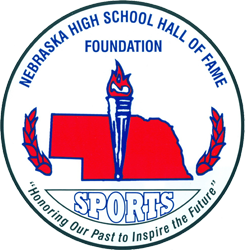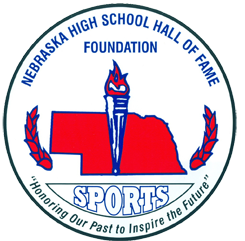A Son Remembers
Following item was written by Pete Letheby, associate editor of The Grand Island Independent, about his father, Hall of Fame Coach Fred Letheby.
I had envisioned the band playing an encore of the school fight song—congratulations, handshakes and high fives from players, coaching colleagues and fans. Perhaps, a short farewell speech. At least a smile.
But there was none of that.
Instead, Dad slipped out a side door at Northeast Community College, his right foot in a cast, carefully maneuvering his crutches around patches of ice. His Madison Dragons had just lost their first-round district game, falling to Columbus Lakeview in overtime after holding a double-digit lead in the second half.
And that was it. That was the last of 971 high school basketball games, from just after World War II to a few years short of the new millennium.
It was a sunny Saturday afternoon, but it was a melancholy, indffierent sun on this February day in 1994. Nobody said a word. Nobody was smiling. Then the coach said something like, “We had it and let it get away.” It was something he’s probably said dozens of times before.
I didn’t know what to say as we drove home. What do you say after 612 high school basketball victories in six different decades? What do you say to justify all the practices, games and district tournaments, to all the pre-game introductions, halftime pep talks and last-second shots?
What do you say after all that?
I don’t think Dad took much time to reflect on all of it—the incredible longevity, the greatest wins, the most disappointing losses, the timely baskets and the untimely turnovers. If he did, he didn’t talk about it.
Once, during his final season in the winter of 1994, he suggested I might write an article around him. It wasn’t a moment of vanity. I think, at that moment, he was beginning to realize that I would soon end.
Then he died, on Sept. 25, 1995, just after his 69th birthday. There was just over a year to remember it all, relive the memories, hear the echoes of past cheers.
If he’d had more years to reflect on it all, I’m not sure what he would’ve recalled first. I didn’t know what he cherished most, what he remembered most vividly.
Maybe it was the two state championship teams—two decades apart in two communities less than a half-hour’s drive apart, Stanton and Madison. They were special teams, special days, culminations of dedicated and persevering players and coaches who reached the pinnacle.
Maybe it was the 17 district titles, many of them won as underdogs when few others thought it could be done.
Perhaps he thought a lot about thosse teams that went far after many have given up on them. Like the 1978-79 Madison team that stood a mediocre 6-11 before districts, but upset three opponents in districts and lost a chance to go to state on a last-second basket.
Or maybe the 1964-65 Stanton team, the team which started the year with no returning starters and just two players with varsity experience. Those Mustangs started the season 1-5 and were just 8-10 before districts, when they blew away the first, fourth and second ranked seeds in impressive succession.
Perhaps Dad remembered the five-overtime games in 1962 when he was coaching at Neligh and his Warriors lost to Tilden in, up until then, the longest game in Nebraska history.
Maybe he would’ve recalled the 1973-74 team that ended Howells’ 34-game winning streak. “You’ll be lucky to stay within 10,” I remember telling him before he left for the game. He smiled when I said it. I think he knew something then.
Or perhaps his most teasured memory would not have been basketball at all. Maybe he most cherished that 26-game winning streak in football at Norfolk Sacred Heart between 1954 and 1956.
Or maybe he appreciated the players most of all, the hundreds and hundreds of teenagers he coached and influenced. The kids who meant so much to him.
The names come off like a fast break. There were Johnny Lawler and Duane Crotty, and Larry Kellogg and Ralph Vincent from old Norfolk Sacred Heart days. There were Jim Korshoj and Leland Hoepfinger playing in that crackerbox gym in Neligh. There was Mike Siemsglusz, Wally Kettler and others at Stanton, whose 1964 state championship team was, for more than three decades, featured on a large portrait you couldn’t miss when entering the gym.
Then there were Madison’s basketball players, amost three decades worth. He prized them all, from Merlin Renner to Kevin Hoffart, Dave and Craig Wehrle to Kent and Kurt McCallum, Clayton Morlok to Bob Geary, Mike Weiss to Jeff Wolfgram—and all the other fiery Dragons, too, from the leading scorers to the reserves to the student managers.
There were setbacks and heartbreaks, of course. No coaching career that long goes without any.
Dad accepted the defeats, but some lingered longer than others. He had a keen appreciation for his opponents. Those names, too, will never be forgotten. “They were just too good for us,” he sometimes say after a loss.
Guys like Kent Payne of Palmore and Jeff Johnson of Stromsburg stabbed Madison with last-second shots in regional playoffs. Players as big as 6-foot-10 Chuck Jura of Schuyler or a small as five-foot-six David Beetley of Fairbury helped beat Madison teams with heroic efforts at the state tournament.
There were Brent Fahnestock and George Schroeder at Laurel, Larry Otto and Rusty Mailliard at Norfolk Catholic, and coaches such as Don Kelley, Jim Morrison, Paul Brungardt and Harold Maciejewsi.
The guys in stipes, too, were fondly remembered—Jerry Neely, Duane Hodge and the rest—and the people who wrote about the action. “Dad”, I’d often whisper after answering the phone ona Sunday afternoon, “It’s Conde Sargent,” or “it’s Denny Fuehrer.”
I think Dad cherished it all—the players, the games, the lifestyle, the excitement, the cheers, the strategies and the competition.
He signed his 1959-60 contract to teach and coach three sports at Norfolk Sacred Heart for $4,000. He would have accepted the same amount a quarter of a century later, I think, if it would have been enough to provide for his family.
Dad was a simple guy, but it was a classic, down-to-earth, wonderful simplicity.
He had no exotic visions of coaching on the collegiate level, or even at larger high schools, although he certainly had the opportunities. He never concerned himself with the hundreds of victories.
Near the end of his career, some people felt he hung around so he could become Nebraska’s winningest high school basketball coach. I think he was hurt a bit by all that. I think he was hurt a little when he learned that some people didn’t want him back.
I’m not sure those people really knew him outside the basketball gym. Sure, he could be a bit stodgy and stubborn and some thought he was overly traditional. He preferred big band over rock’n’roll, the Celtics over the Lakers, bass fishing over jetsetting. For his players, he preferred short hair and neckties over rattails and jeans.
But his values always were impeccable and his intentions always honorable. Dad never cut out when the going got tough. He never left a basketball program because the next few years looked bleak, or because more stature beckoned elsewhere. I saw other coaches do that all the time.
Somehow, in this gilded, Diet Dew, frenetic world of ours, I get the feeling we need more people like him, no matter how old-fashioned he may have seemed.
Like many people of these qualities, Dad died too soon. He won’t get a chance to say something when he is inducted into the Nebraska High School Sports Hall of Fame this month. He would’ve loved to have seen Stanton win its first state basketball championship since the one his team earned in 1964. He would’ve savored fishing some more with his friends and grandkids, and golfing some more with my mother.
Some people have called him a coaching legend. I’ve always felt a bit uncomfortable with that level. I know he did, too.
He was a good coach, for sure, a very good coach. But most of all, he was a good man, an extraordinarily simple guy who just loved to coach basketball.
When I drive through those endless rolling hills in northeast Nebraska, I still hear the cheers. I still hear the school fight songs, and the introduction of the starting players and coach. And I still see Dada, sitting on the bench, getting ready for another game.

